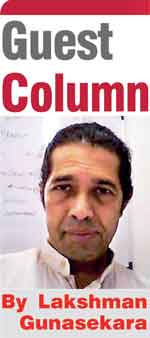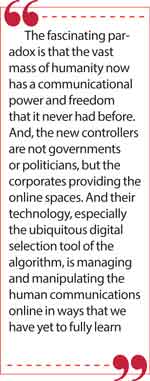Friday May 24, 2024
Friday May 24, 2024
Friday, 3 May 2024 00:20 - - {{hitsCtrl.values.hits}}

We, the people, have an ability and power provided by the tech giants
 In the past two years, the United States Congress, that is the combined Senate and House of Representatives, have been regularly summoning and interrogating the representatives and heads of some of the world’s biggest and most powerful corporations. Actual chairpersons of massive, globalised companies, whose brand names are familiar to anyone using a smartphone, were grilled in an unusually hostile manner by top US politicos, often in sessions telecast live to the world.
In the past two years, the United States Congress, that is the combined Senate and House of Representatives, have been regularly summoning and interrogating the representatives and heads of some of the world’s biggest and most powerful corporations. Actual chairpersons of massive, globalised companies, whose brand names are familiar to anyone using a smartphone, were grilled in an unusually hostile manner by top US politicos, often in sessions telecast live to the world.
Those familiar with American government and its consistent partiality to business, especially American big business, would have wondered at this hostile probing and public criticism of some of the biggest of big businesses. It was certainly almost unheard-of political behaviour by a body of politicians legendary for voting in favour of business and, enjoying financial handouts from such corporates.
In fact, commentators noted that never before had any sector of big-time industry been targeted in the way that this sector had been by Congressional special committees. What is this sector that had been targeted?
The sector under fire is what is popularly known as ‘Big Tech’. They are the newest creatures in the world of global capitalism. They are the giant corporations that now manage – many critics would say “govern” – the world’s yet growing industry of digitised information and communication technology (Digital ICT).
They included the owning corporates of Google, Apple, Facebook, Amazon, Alibaba, Metadata (X), TikTok, and several others with equally familiar, even well-loved, brand names (this writer, for example, loves YouTube).
But are not there many other, equally huge corporates also using data and digital technology on massive scales? Raytheon, which makes all kinds of electronic and electrical products, but perhaps most famous for its hi-tech weaponry, heavily relies on ‘big data’. Many other giant corporates like Walmart, an enormous multinational supplies chain (including supermarkets) also rely heavily on big data.
In fact, in this new age of digitised information and high speed communications, most of the world’s businesses – from the smallest fisherman using his mobile phone to sell his morning’s catch in Batticaloa, to your friendly fast food provider on a tired Friday night, to a big pharmaceutical firm or, a tour operator fixing a group for the next season – use digital data.
While many of them may find their digital data capacity an added boost to their service efficiency and competitiveness, an increasing number of businesses have emerged purely from digital data usage and rapid communication. They are pure creatures of the Internet and cannot function outside it.
Online
In fact there are political movements that are purely or primarily functioning online. Insurgent groups now are created online and fine tune their lethal operations by means of social media and digital mapping, satellite target selection and other deadly magic.
On the softer side, there are millions of musicians and aspiring musicians as well as video-makers who work and earn entirely online.
And what about the few billion adults and teens who socialise entirely or mostly online in video gaming (and gambling, too) in whole clubs of participants living in widely distant parts of the world? The varied time zones mean that such online socialising and leisure is literally 24 hourly and there are many cases of online addiction in which lack of sleep, body posture stress, eye problems and attention-focus problems are the harmful outcomes.
Most productive in economic terms is the new digital platform economy.
What is described above is the brave new universe of digital interactions between human and human and between human and machine and, most ominously, between machine and machine.
But why have only a certain type of Big Tech corporates been hauled up before the world’s most powerful government? Why are they being subject to probing questions, stern accusations and even threats of control or, in the case of one media platform, of a full ban?
The names of those undergoing the US politicians’ grilling – as well as similar grilling by UK politicos – are all corporates not so much in manufacturing of any kind other than production of improved software and some hardware (in some cases) that will maximise their main activity. Their primary business is the enabling of online communications and the sharing and storage and sale of digitised data.
Server companies
 Some of this ‘enabling’ has become so much part of human intellectual activity that, for example, one’s online search for information is done by “googling”, the name of the server company.
Some of this ‘enabling’ has become so much part of human intellectual activity that, for example, one’s online search for information is done by “googling”, the name of the server company.
And the Internet industry’s success has dethroned numerous sections of once-similarly powerful ‘enablers’ of humanity’s many endeavours. As listed above, today, many parts of human and social life, indeed, livelihoods, need digital services of some kind.
Old communicating agencies, especially the news media, which at one time, was critical for political decision-making and also simply winning elections and impressing vote banks, has been dethroned.
The mass media has reigned for 300 years if not longer. Their power was recognised nearly two centuries ago with their identification as the ‘Fourth Estate’. The ‘Fourth Estate’ recognised the fourth locus of power in society (in modernising Europe) after the already existing three ‘estates’ of monarchy/politicians, church and commons.
Indeed, the news media (at the time, only the press) was identified and duly named by the very politicians (the legislators and, till then, the opinion leaders) whose power was partly taken over by the incoming Press.
Press Freedom Day
Today, the World Press Freedom Day – as designated by the United Nations – is celebrated across the world but the celebrants, themselves, are no longer that easily identifiable or even noticeable. We are in transition from the Fourth Estate to the Fifth.
By the early 20th century that Fourth Estate had expanded to include radio and television industries. It soon dominated many aspects of political life, from electoral governance to social violence.
The worst lessons of the perfidious side of the Fourth Estate were learned during the two Gulf Wars when much of the world had watch the world’s dominance power bloc, the Western alliance, wage most destructive war that relied on falsified information of ‘weapons of mass destruction’. The world was aware that Iraq did not have a stockpile of WMD. But the big news media, the Fourth Estate – at least the most prominent agencies – seemed to endorse the claims of Western governments about WMD.
The same news agencies went on to report the awful consequences – devastating war that also disrupted the world economy affecting the bulk of the world population that was quite uninvolved in the conflict.
But that was some three decades ago.
Fifth Estate
Now the Fourth Estate has been dwarfed by the Fifth Estate, an entirely new information structure, the contours of which are yet to be clearly defined. The Fifth Estate is the new term being used to describe the world of digital ICT and the numerous information systems that have emerged from it.
That it deserves the term ‘estate’ is agreed by many analysts of digital communication and the new power that this new system wields over society.
But there is also a welcome difference. The Fourth Estate was centralised in information output and one-way in dissemination. The recipients could neither react to the information they receive nor question it.
The digital media, the Internet, is all about actual exchange of information and all expressions of humanity – from hate to desire, from absorption to rejection.
Today, most wonderfully, the Internet provides platforms for continuous communication between people. The Fifth Estate has now built more virtual societies in cyberspace than is humanly feasible in real life.
If not for this Fifth Estate, the human community would not know the worst depredations ongoing in Palestine, today. In our own country, depredations by political elites would not have been exposed but for the Fifth Estate – the social media run by the very Big Tech giants harassed by the US Congress.
The sheer social, economic, political and cultural effects and experience that digitisation provides is such that the “Fifth Estate” has become a far greater power than the Fourth Estate ever was.
But given the very nature of the system, there is little to enable control – except by the very Big Tech industry that has built and operates it.
Governments have so far not been able to control it other than by enforcing a complete shutdown of digital communications in any given geographical area or sector of activity. This has been the practice by many governments that have faced situations of severe social and political insecurity which have arisen through the heavy usage of cybermedia.
Governments – from Egypt to India to Sri Lanka to Burma – in desperation, have simply pulled the plug. But this means that modern society’s communications-based activities in the area or sector shut down are also halted. Personal intercourse, digital business, digital administration, digital health management and many other vital activities are affected.
Thus, in the new cyberworld, the corporate cyber giants wield more power than to government and, indeed other political actors, like legitimate political parties.
The fascinating paradox is that the vast mass of humanity now has a communicational power and freedom that it never had before. And, the new controllers are not governments or politicians, but the corporates providing the online spaces. And their technology, especially the ubiquitous digital selection tool of the algorithm, is managing and manipulating the human communications online in ways that we have yet to fully learn.
But even as we learn of the new boundaries being imposed by the digital corporates, we still are exploring the exciting possibilities of business, civic activism, leisure, arts and many other good things in life. We, the people, have an ability and power provided by the tech giants.
This is why the digital giants are being targeted by the US Congress. Is this why governments across the world are targeting online communications? The public that lives both online and offline needs to be alert to this threat to their new freedom as citizens.